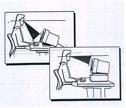Work and health
- Medical Records & Confidentiality
- Sickness Absence Policy
- Sickness Absence Forms
- Display Screen Users
- Foreign Travellers
- Looking after your voice
- The Effect of your Health and your Ability to Work
- Avoiding Common Illnesses and Recovery
- Pathways to Health from Sick Leave
- Cancer comes with many worries - help make sure work isn't one
- Health Information Guide
- Health Surveillance
- Work Related Health Conditions
- Chemical, Biological or Radiological
- GERMS!
- Guidance on menopause and the workplace
Display Screen Equipment (DSE)
One of the greatest potential hazards within the office environment is the computer (DSE) and with many employees using computers for a large part of their working day if there are any problems with your workstation or computer this can affect your health. Although some symptoms may only be temporary (eg. headaches and eye strain) if the issues with the workstation and working methods are not remedied they can also lead to more serious permanent health problems such as carpal tunnel syndrome. It is therefore important to take care of yourself and follow some easy practical steps to ensure your computer use does not put you at risk.
The following advice is intended to prevent repetitive strain and allow you to work with greater ease
Work in comfort

Don’t arrange your work area in a way that causes you to repeatedly strain forward to see and reach frequently used items.
Make the best use of space

Remove any obstruction under your desk that either prevents you from sitting upright or restricts legroom.
Adjust your adjustable chair

Adjust your backrest tilt and/or height to support your lower back.
Comfortable key board use

Adjust your seat height until your forearms are approximately horizontal.
Foot rests

If you cannot comfortably rest both feet flat on the floor, use a footrest.
Straight wrists

Avoid bending your wrists when keying.
Look after your mouse

Position your mouse immediately to the side of your keyboard and use with a straight wrist.
Display Screen

Avoid a stiff neck by adjusting your display screen height to your level of comfort. Adjust the monitor position and angle to minimise any screen reflections. Keep the screen clean and adjust the brightness & contrast control to suit you.
- If possible, alternate work tasks so you have natural breaks form keyboard work and take your scheduled breaks. Muscle fatigue is reduced by stretching your arms and legs!
- Any if you are having difficulty meeting your deadlines and are feeling stressed talk to your Boss!
For further information about display screen work, please visit the DSE Information page
